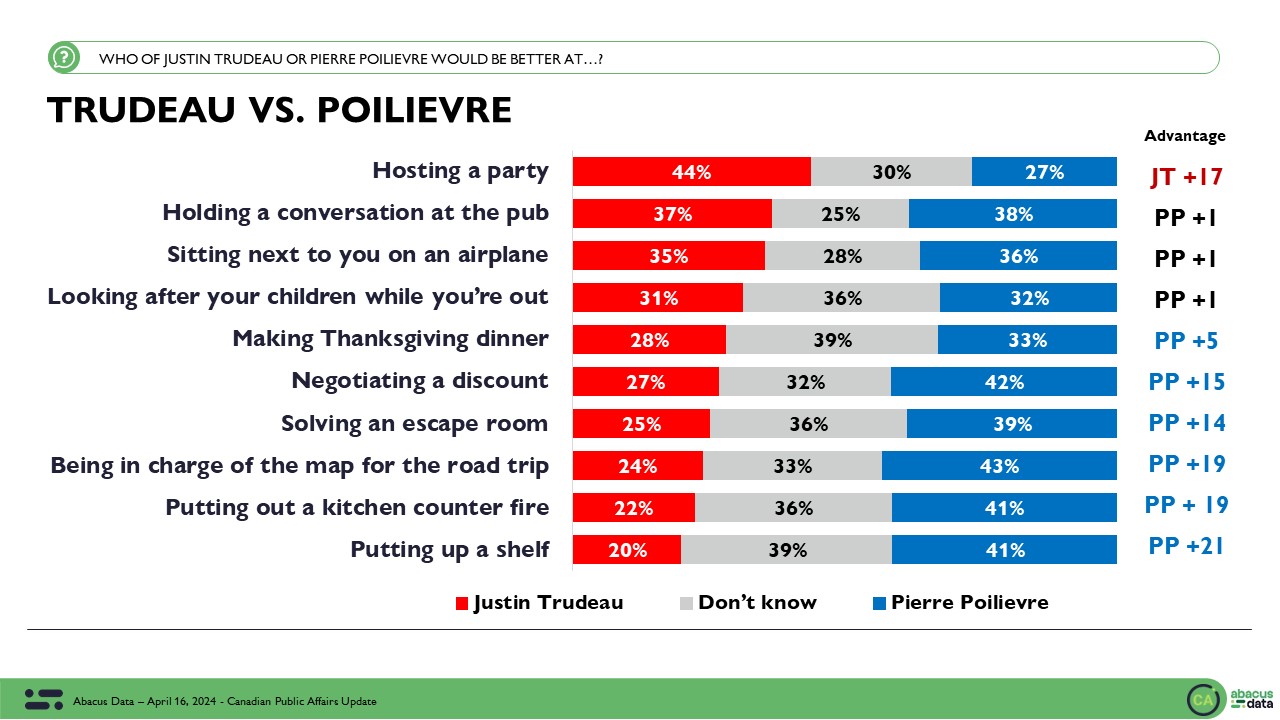State of the Province: How Do Nova Scotians Feel About the Provincial Government and Their Political Choices?
May 2, 2022
As Nova Scotia Premier Tim Houston is set to deliver his first annual State of the Province Address tomorrow, in partnership with Summa Strategies, we surveyed 500 Nova Scotia residents from April 14 to 21 exploring their overall mood, their views on the government’s performance today, the top issues in the province, and what their specific priorities are when it comes to healthcare in the province.
Here’s what we found:
MOOD OF THE PROVINCE: MORE THINK THE PROVINCE IS HEADED IN THE RIGHT DIRECTION THAN OFF ON THE WRONG TRACK
Right now, 43% of Nova Scotians believe the province is headed in the right direction compared with 35% who think it is off on the wrong track. Another 22% are unsure.
These views are influenced by perceptions about the economy where about half describe the state of the provincial economy as good and about half think it is performing poorly. Those living in or around Halifax are slightly more likely to think the economy is doing well than those living in other regions of the province (Halifax 50% very good/good vs. other regions 43%).
For about half of the province, the rising cost of living is a concern with 30% saying they are very worried about their ability to deal with the rising cost of living and another 17% saying they are pretty worried.
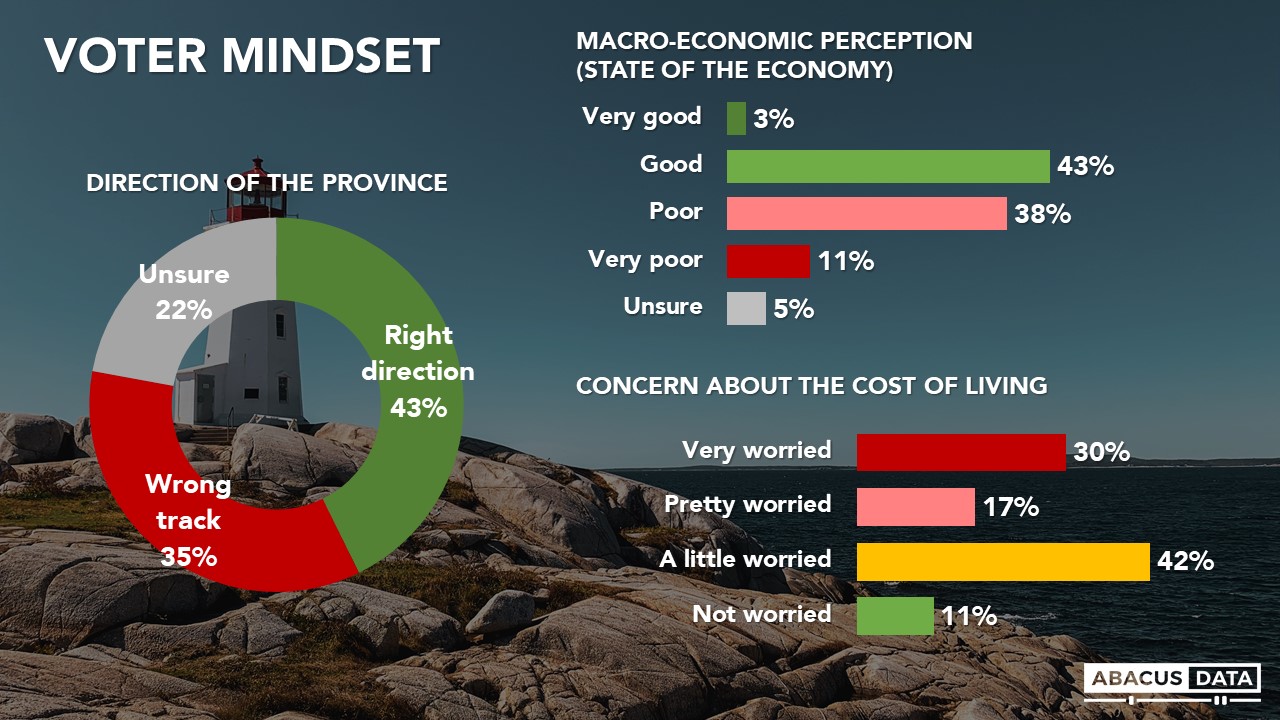
TOP ISSUES: HEALTHCARE, INFLATION, AND HOUSING AFFORDABILITY TOP THE LIST
When asked to rate the top three issues facing the province, healthcare, inflation, and housing affordability clearly stand out as most important to a majority of Nova Scotians. 70% rated healthcare as a top issue, followed closely by inflation at 68% and housing affordability rounding out the top 3 at 54%.
Other top issues included the economy (24%), infrastructure like roads (19%), the environment and climate change (17%), and drug addiction and mental health (11%).
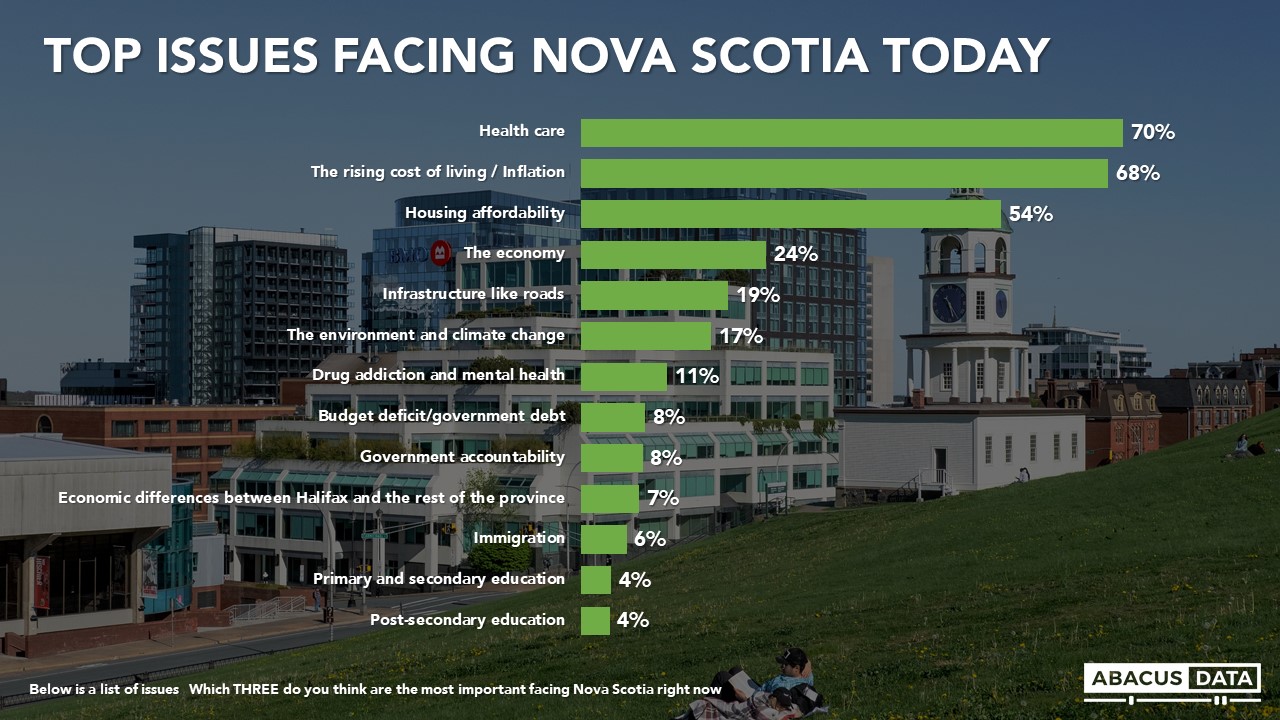
PROVINCIAL GOVERNMENT APPROVAL
Nova Scotians are much more likely to approve of the job performance of the provincial government than disapprove. 46% approve while 25% disapprove. The remaining 30% neither approve nor disapprove. It is worth noting that while more approve than disapprove, only 7% strongly approve of the government’s performance – suggesting residents are generally positive about the approach and performance but not enthusiastic about it. This muted approval is confirmed when we explore specific policy areas.
Among NS PC voters in 2021, 72% approve of the government’s performance to date while 9% disapprove. A plurality of opposition party voters also approve of the government’s performance including 53% of NS Liberal voters and 37% of NDP voters.

When asked to rate the provincial government’s performance in specific areas, a clear majority describe the government’s performance as acceptable or better when it comes to education, climate change and the environment, the provincial budget, and growing the economy. However, evaluations are less positive when it comes to keeping taxes low, improving the healthcare system, and keeping the cost of living manageable. On two of the top issues in the province, the provincial government’s negative ratings are higher.
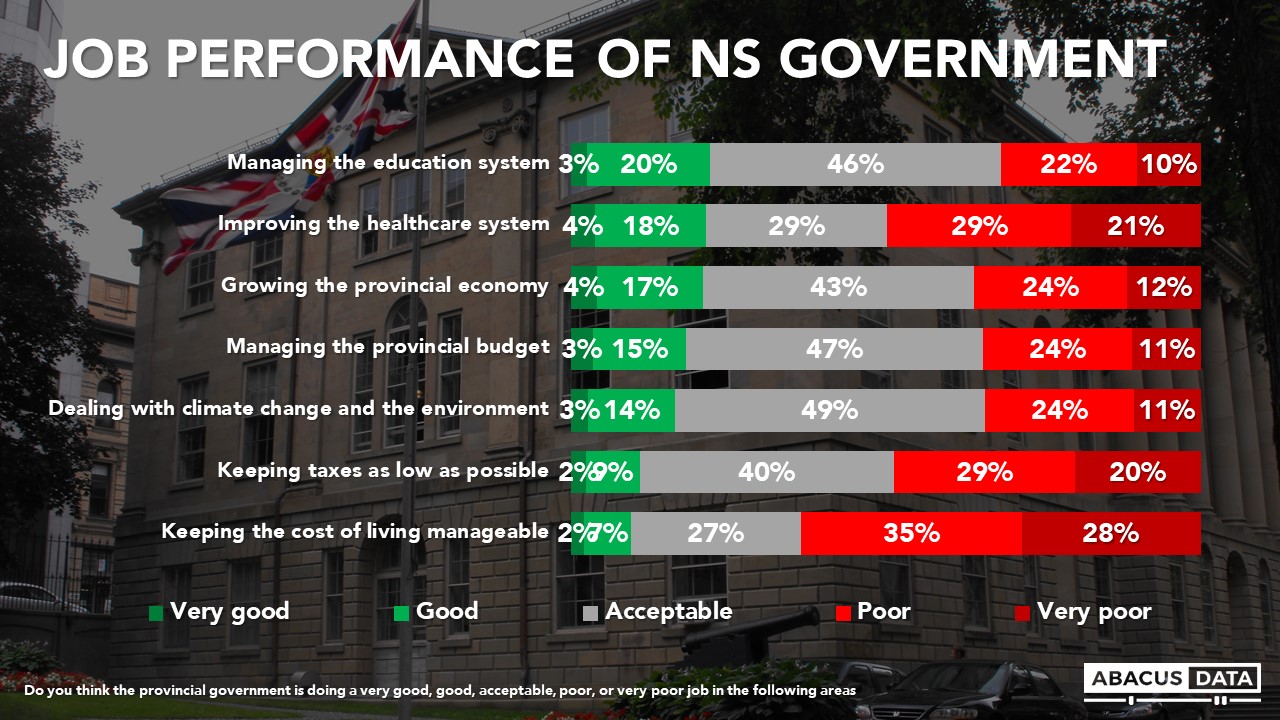
Despite some friction on a few key issues, most Nova Scotians feel that the provincial government, first elected in August 2021, has performed about as well as they expected or better (Better 19%, As expected 47%). In contrast, 23% feel it has performed worse than they expected.
PROVINCIAL GOVERNMENT PRIORITIES? HEALTHCARE, HOUSING, ELECTRICITY, AND COVID-19
Respondents were shown a list of possible things the provincial government could focus on and asked to rate how much of a priority each should be.
81% felt that improving the healthcare system should be a top priority, far higher than any other issue. Another 68% rated housing affordability as a top issue followed by dealing with COVID-19 (53%) and the price of electricity (52%).
Economic growth (47%), improving the job situation in the province (41%), and dealing with drug addiction and mental health issues (41%) were rated as a top priority by more than 40% of respondents.
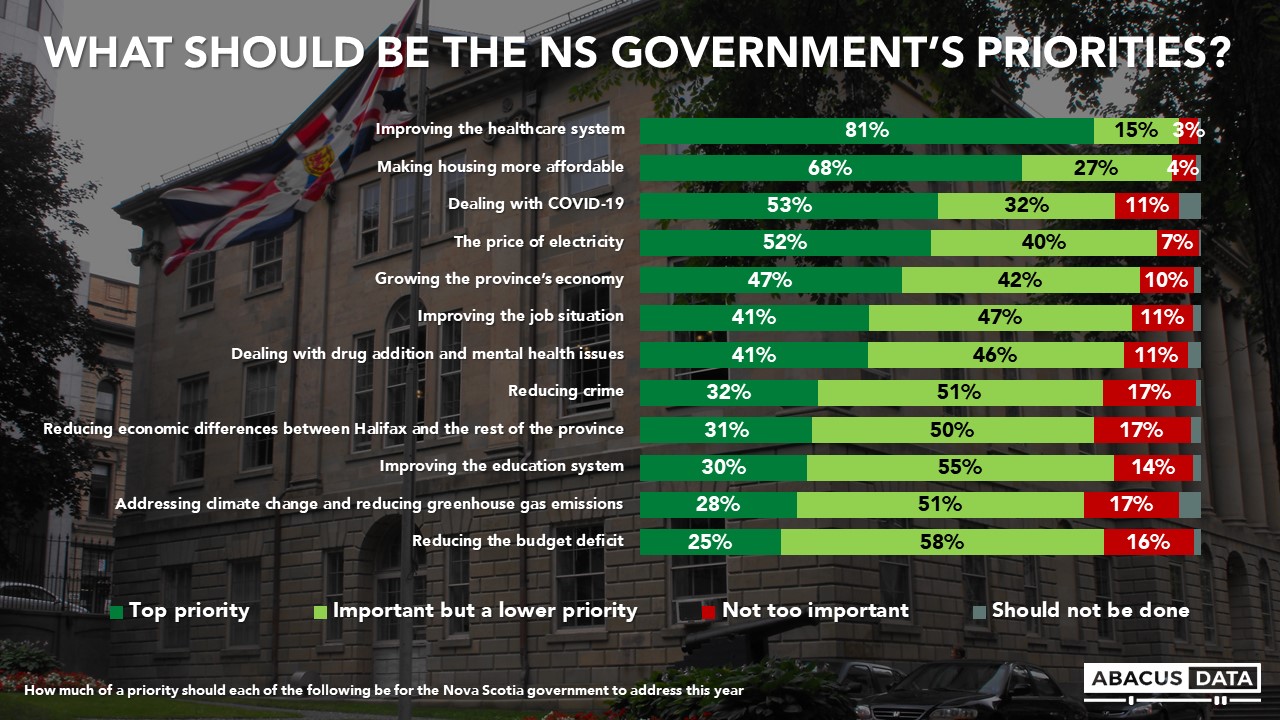
HOW IS THE GOVERNMENT DOING IMPROVING HEALTHCARE IN NOVA SCOTIA?
When asked how the provincial government is doing fixing the healthcare system, as it promised to do in the last provincial election, 18% feel the government is making good progress in improving the system while 33% feel it is making some progress, but less than they expected at this point. 35% feel the government has done very little to improve healthcare.
Among those who voted PC in the last election, 30% think the government is making good progress in improving the healthcare system 41% think it’s made some progress, but less than expected, while 19% feel it has done very little so far.
Among the 81% who felt healthcare should be a top priority for the provincial government, 17% feel it has made good progress, 32% think it has made some progress, but less than expected while 38% think it has done very little to address the issue.
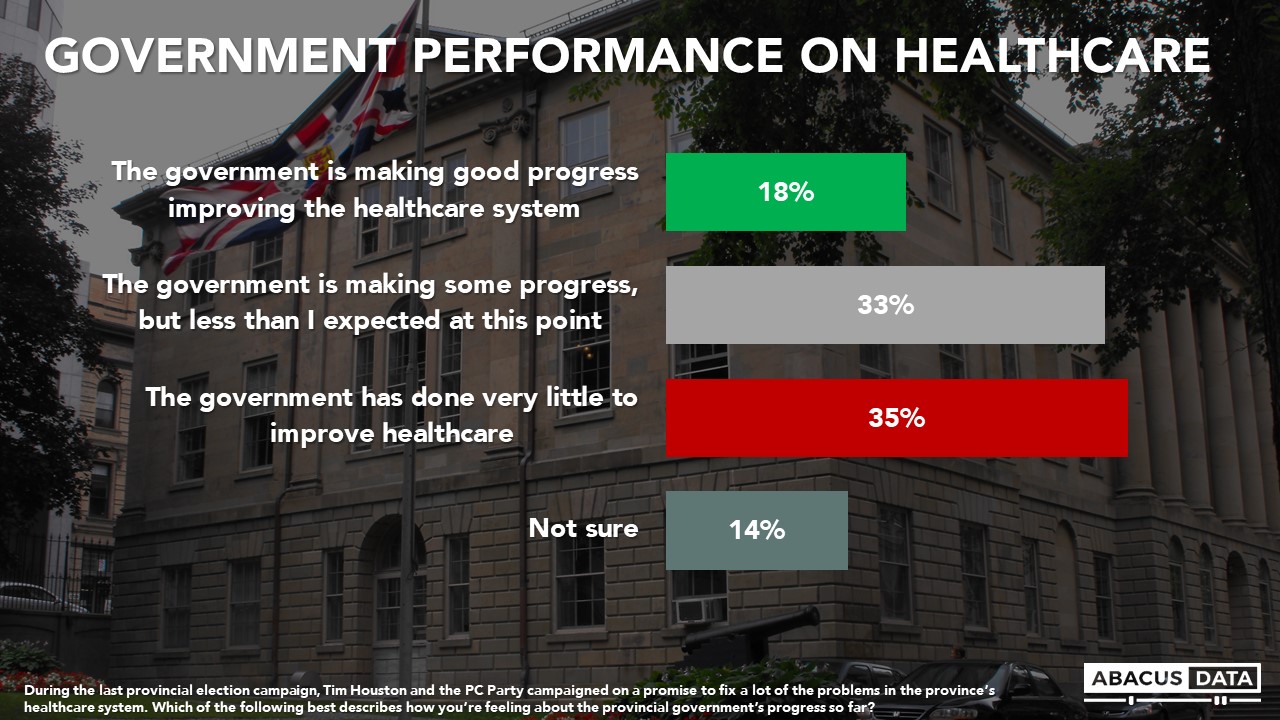
There is some skepticism about the government’s ability to fix the problem. While 53% think that fixing the healthcare system could definitely or could probably happen, 46% are less convinced.
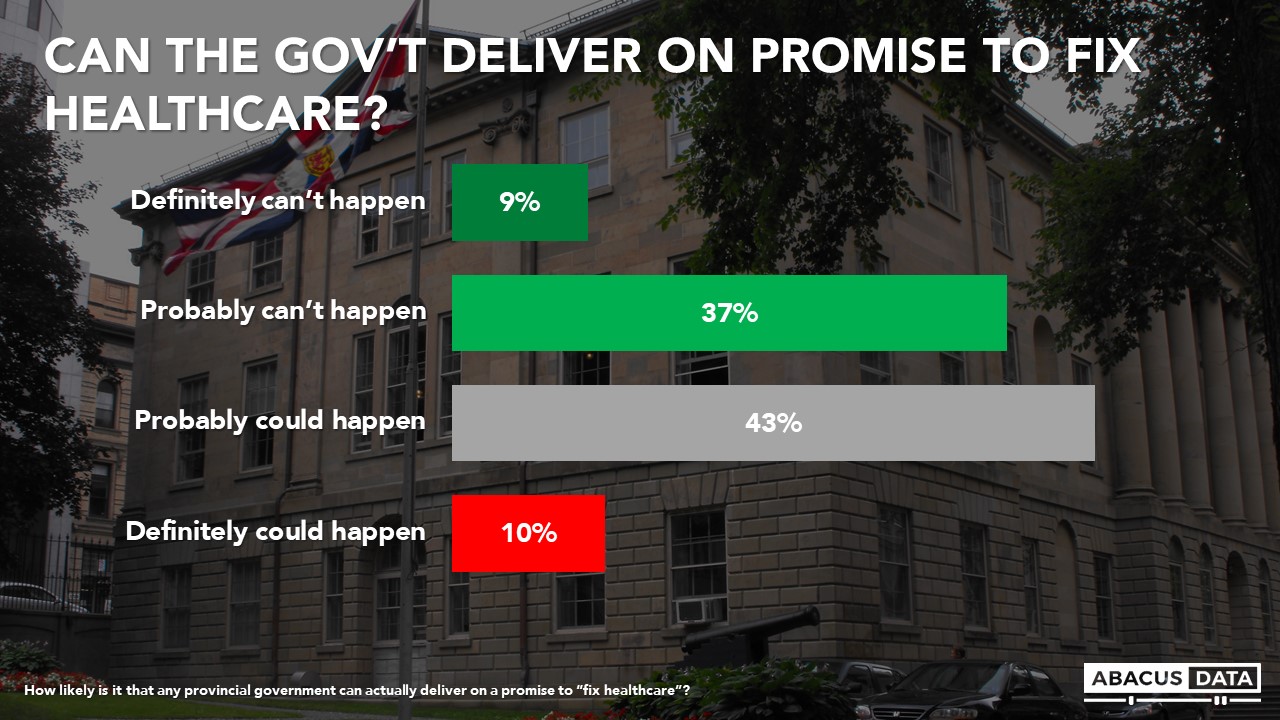
ACCESS TO FAMILY DOCTORS IS THE TOP HEALTHCARE PRIORITY FOR NOVA SCOTIANS
When asked to rate the importance of specific improvement areas in healthcare, 52% said increasing the number of family doctors where they are most needed should be the top priority, followed by 16% who felt more specialists to tackle long wait times was the top priority. 14% wanted to see collaborative care clinics be the priority while 11% wanted to see more nurses being allowed to do more for patients.
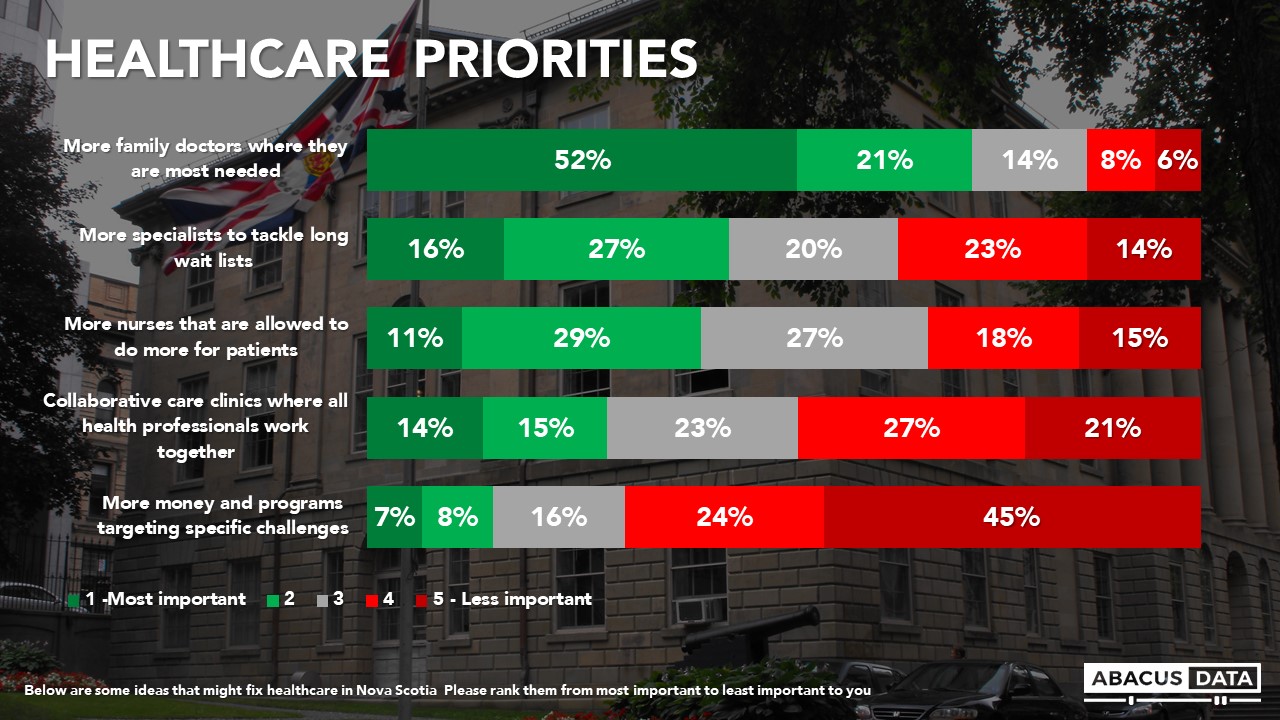
VIEWS ON PREMIER HOUSTON AND POSSIBLE OPPOSITION LEADERS
Overall, Premier Houston’s personal image is quite positive. 43% have a positive impression of him while only 18% have a negative view. 28% have a neutral impression while 10% are unsure. Among those who voted PC in the last provincial election, 75% have a positive view while 4% have a negative one. 50% of Liberal voters and 29% of NDP voters have a positive view of the premier.
In contrast, when we ask about candidates running to be leaders of the NS Liberal Party and NDP, 19% have a positive view of MLA Zach Churchill, compared with 14% who have a negative view. 34% have a neutral view while 33% don’t know him well enough to have an opinion. Angela Simmonds, another candidate for the NS Liberal leadership is viewed positively by 15% while 12% have a negative view. 43% don’t know enough about her.
NDP leadership candidate and MLA Claudia Chender has 17% who view her positively with 9% who view her negatively. 43% also don’t know enough about her to have an opinion.
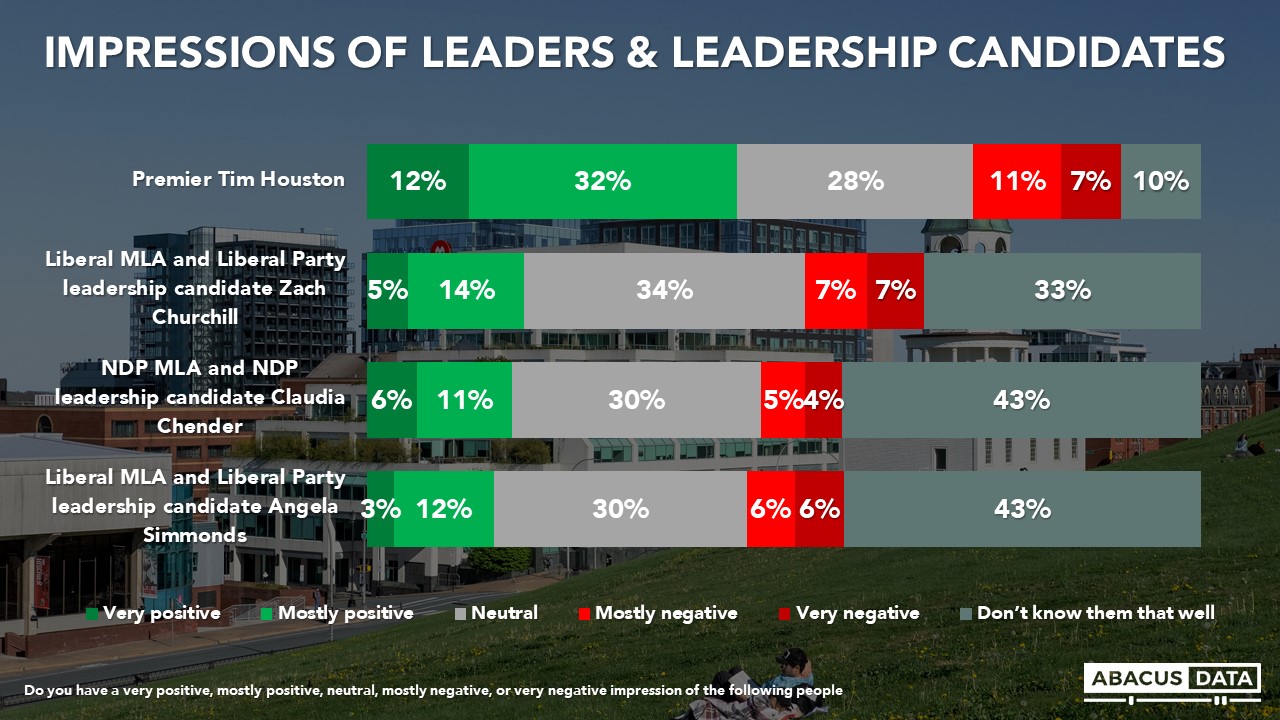
When we asked whether a series of descriptions apply or not to Premier Tim Houston, in every example, more think the term applies than not. 61% think he is intelligent, 52% think he’s likable, and 45% would describe him as a strong and decisive leader. Twenty percent or less don’t think those terms apply to him.
More also think that he cares about all regions of the province, is honest and trustworthy, can manage the government effectively, and cares about the needs of people like them than don’t.
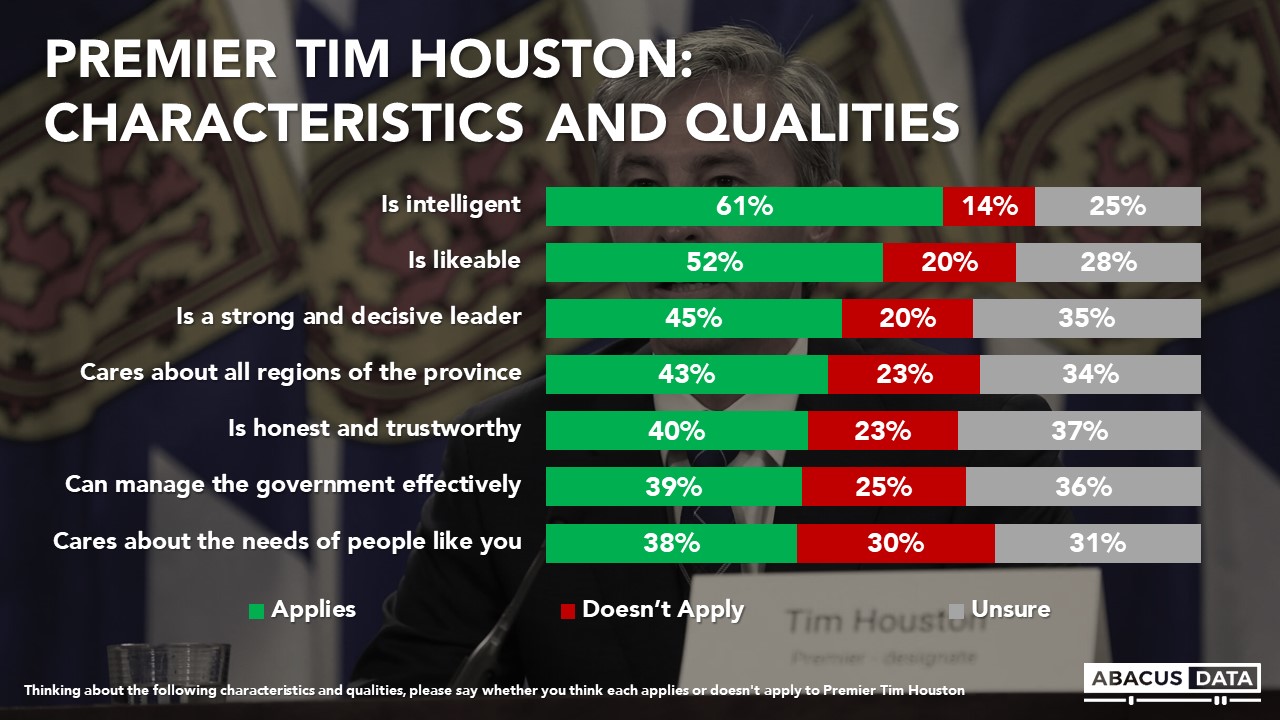
VOTE INTENTION: PCs LEAD BY 8 OVER THE LIBERALS
When asked how they would vote if an election were held today, the PCs would very likely win another majority government. 39% would vote PC followed by the Liberals at 31% and the NDP at 23%. Apart from a dip in Liberal support, these results line up close to the results of the 2021 provincial election.
Among the 81% who said healthcare should be a top priority for the provincial government, 42% would vote PC, 31% Liberal, and 21% NDP.
In Halifax, it’s a close three-way race with the PCs at 32%, the Liberals at 31% and the NDP at 29%. Outside HRM, the PCs have a big 13-point lead, with 44% compared with 31% for the Liberals and 18% for the NDP.
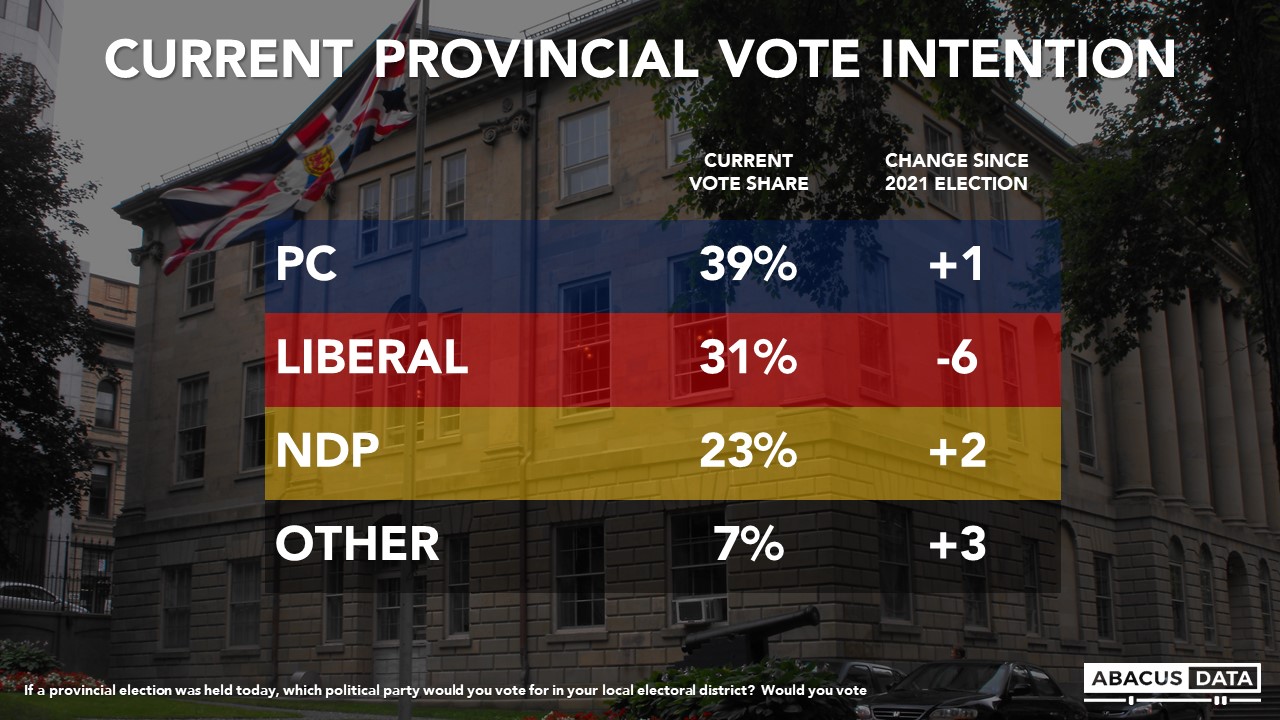
UPSHOT

According to David Coletto: “It has been 244 days since Tim Houston and the PCs were sworn in as the new government in Nova Scotia. So far, most Nova Scotians have been satisfied with the government’s performance and far more have positive views of the premier than negative ones.
Nova Scotians want to see action on three issues in particular – healthcare, the cost of living, and housing – and most think the government will be able to fix the healthcare system as it promised. So far, most of those who voted PC and many who didn’t are giving the government the benefit of the doubt.
While this survey was conducted prior to the release of the government’s healthcare plan, it’s clear that perceptions about the healthcare system and the government’s performance in improving it will be a key driver to how people feel about the government overall. Its election promise to fix healthcare was instrumental in its election. And its performance delivering will likely be critical to how Nova Scotians evaluate its performance.”

According to Shay Purdy, from Summa Strategies: “The Houston government will be pleased to see that the issues they prioritized through the opening legislative session and in their first budget remain very top-of-mind for Nova Scotians. While the prominence of these top issues of health care, cost of living, and housing affordability creates a clear picture for the government of where they should continue to be focused, there will absolutely be a challenge in meeting expectations in these areas – all of which, it could be argued, are currently in some degree of crisis.
The Premier’s personal numbers and the government’s approval ratings are also looking quite strong, even among those who voted for a different party in the last election. Incoming leaders of the Nova Scotia Liberals and the New Democrats have their work cut out for them following their leadership decisions, which take place in late June and early July.”
METHODOLOGY
The survey was conducted with n=500 Nova Scotia residents aged 18 and over from April 14 to 21, 2022. A random sample of panelists were invited to complete the survey from a set of partner panels based on the Lucid exchange platform. These partners are typically double opt-in survey panels, blended to manage out potential skews in the data from a single source.
The margin of error for a comparable probability-based random sample of the same size is +/- 4.4%, 19 times out of 20.
The data were weighted according to census data to ensure that the sample matched Nova Scotia’s population according to age, gender, educational attainment, and region. Totals may not add up to 100 due to rounding.
This survey was paid for by Abacus Data Inc and Summa Strategies Canada Inc.
ABOUT ABACUS DATA
We are the only research and strategy firm that helps organizations respond to the disruptive risks and opportunities in a world where demographics and technology are changing more quickly than ever.
We are an innovative, fast-growing public opinion and marketing research consultancy. We use the latest technology, sound science, and deep experience to generate top-flight research-based advice to our clients. We offer global research capacity with a strong focus on customer service, attention to detail, and exceptional value.
We were one of the most accurate pollsters conducting research during the 2021 Canadian election following up on our outstanding record in 2019.
ABOUT SUMMA STRATEGIES
Summa Strategies Canada provides a full suite of public affairs services grounded in a firm understanding of the political environment, government process and legislative procedure. Headquartered in Ottawa, we help our clients interpret and navigate their landscape of opportunities and challenges with the federal government and provincial governments across the country
Find out more about how we can help your organization by downloading our corporate profile and service offering.


